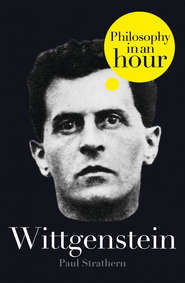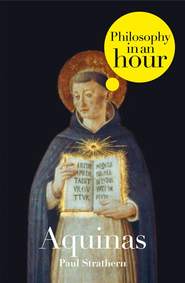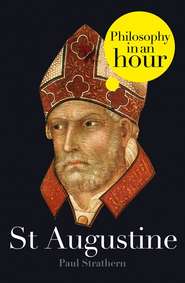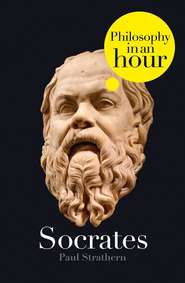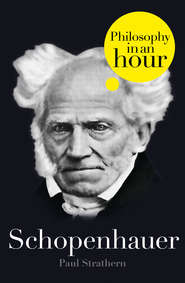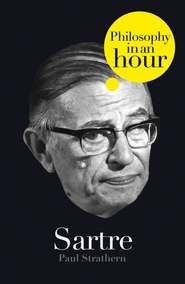По всем вопросам обращайтесь на: info@litportal.ru
(©) 2003-2024.
✖
Berkeley: Philosophy in an Hour
Настройки чтения
Размер шрифта
Высота строк
Поля
Berkeley: Philosophy in an Hour
Paul Strathern
Philosophy for busy people. Read a succinct account of the philosophy of Berkeley in just one hour.Berkeley’s philosophy denies the existence of matter. According to his work, there is no material world, only our own experience. So when you don’t see something, it isn’t there. Then how does the world persist? Because it is supported by the continuous perception of an all-seeing God. Berkeley’s ideas appear to take empiricism to a ludicrous extreme. But is this quite so absurd as it seems? We are frequently forced to abandon common sense and the obvious in order to progress beyond the immediate muddle of everyday existence towards what we consider to be the truths of science.Here is a concise, expert account of Berkeley’s life and philosophical ideas – entertainingly written and easy to understand. Also included are selections from Berkeley’s work, suggested further reading, and chronologies that place Berkeley in the context of the broader scheme of philosophy.
Berkeley
PHILOSOPHY IN AN HOUR
Paul Strathern
Contents
Cover (#u335b7ef6-e3b8-5d61-97aa-11021f26f64d)
Title Page (#u4b240fe1-9de8-554f-8bfd-5021ef39f0df)
Introduction
Berkeley’s Life and Works
Further Information (#litres_trial_promo)
From Berkeley’s Writings
Chronology of Significant Philosophical Dates
Chronology of Berkeley’s Life
Chronology of Berkeley’s Era
Recommended Reading
About the Author
Copyright
About the Publisher
Introduction (#uab62322b-d871-5c38-a444-a5ccd7259002)
Berkeley is the sort of philosopher who gives philosophy a bad name. When you first read his work you think it’s ludicrous. And you’re right, it is. Berkeley’s philosophy denies the existence of matter. According to him, there is no material world.
Modern philosophy had been started in the seventeenth century by the French philosopher René Descartes, who maintained that our only true knowledge of the world is based upon reason. Less than half a century later this Cartesianism, as it was called, was opposed by the English philosopher John Locke, who founded empiricism. Locke took a more common sense view, claiming that our only true knowledge of the world must be based upon experience.
It was perhaps inevitable that philosophy wouldn’t remain constricted within the straight-jacket of common sense for long. Just twenty years after Locke’s Essay on Human Understanding came Berkeley’s Essay Towards a New Theory of Vision, which set philosophy free from what most of us regard as reality. This carried Locke’s empirical thought through to some very noncommonsensical conclusions. According to Berkeley, if our knowledge is based entirely upon experience, we can only know our own experience. We don’t in fact know the world, just our particular perceptions of it. So what happens to the world when we are not experiencing it? As far as we are concerned, it simply ceases to exist.
So according to Berkeley, when you don’t see something it isn’t there. This position is adopted by infants who screw their eyes closed when they wish to avoid eating any more spinach and prune puree. Yet by the time we have achieved the exalted status when we eat our spinach and prunes separately (or not at all), we have usually grown out of this attitude. But not Berkeley. According to him, a tree isn’t there if we don’t see it or perceive it in any other way, such as touch or smell. So what happens to the tree? Berkeley was a God-fearing man, who eventually became a bishop. This led him to an ingenious explanation as to how the world persists when we don’t experience it. His position is simply explained in the following two limericks:
There was a young man who said, ‘God
Must think it exceedingly odd
If he finds that this tree
Continues to be
When there’s no one about in the Quad’.
And the reply:
Dear Sir:
Your astonishment’s odd:
I am always about in the Quad.
And that’s why this tree
Will continue to be
Since observed by
Yours faithfully,
GOD.
In other words: we can know that the world exists only when we are perceiving it. Yet even when we are not directly perceiving the world, it is nonetheless supported by the continuous perception of an all-seeing God.
Berkeley’s empirical conclusion (no permanent reality) and his miraculous solution (an ever-present God) sounds like so much sophistry. Today’s sensibilities for the most part have little time for such apparent intellectual trickery – which seems to belong more to the Middle Ages than to our age of science. So it comes as some surprise when we find that subatomic physics has been forced to a surprisingly similar conclusion to Berkeley’s. According to Heisenberg’s uncertainty principle, we cannot simultaneously measure both the momentum and position of a subatomic particle. If one of these elements is measured (i.e., perceived), the other remains indeterminate. Thus, in a very real sense, only the quality which is being perceived (the measured position, say) is real, and the other quality (its momentum: mass and velocity) does not exist in any determinable form. We can only ‘know’ the one we are perceiving. The other element is in a sense ‘there’ (as if perceived by an all-seeing God), but it cannot come into any determinate existence until we perceive it.
Berkeley’s philosophy appeared to take empiricism to a ludicrous extreme. But when we follow through the implications of our common sense assumptions to their logical conclusions, the result often has little to do with the ‘obvious’ common sense assumptions from which we started. Common sense is how we attempt to run our everyday lives. But if we wish to progress beyond the imprecision and muddle of everyday existence to some more certain truth, we frequently have to abandon the obvious. As Einstein remarked: ‘Common sense is the collection of prejudices acquired by age eighteen.’
Berkeley’s Life and Works (#uab62322b-d871-5c38-a444-a5ccd7259002)
Berkeley was the first (and last) Irishman to make a major contribution to philosophy. He was born on March 12, 1685, in the county town of Kilkenny, sixty miles southwest of Dublin. His father was a royalist English immigrant who referred to himself as a gentleman, but was in fact a young officer in the dragoons who became a farmer.
George Berkeley was brought up near Kilkenny in a stone farmhouse on the banks of the River Nore, beside the ruined tower of Dysert Castle. The farmhouse may originally have been one of the castle’s outbuildings, and it too is now a ruin. The last time I visited this spot, all that remained of Berkeley’s house was some low tumbledown walls overgrown with vines. Across the field was the ruined tower of Dysert Castle with crows cawing about the battlements. Beneath the wooded hills the setting sun glinted in the curve of the river. It must have been much the same in Berkeley’s day.
When Berkeley was eleven he was sent away to board at Kilkenny College, the best school in Ireland at the time. Both the satirist Jonathan Swift and the playwright William Congreve had been educated there during the previous decade. At the age of fifteen Berkeley went on to Trinity College, Dublin, which had been founded two hundred years earlier by Elizabeth I to educate one of her ignorant young admirers.
In 1704, at the age of nineteen, Berkeley received his B.A. degree. He had obviously enjoyed himself as an undergraduate, because he hung around in Dublin for the next few years ‘waiting to take up a fellowship’. During this period Berkeley started to read Locke and the French philosopher Malebranche, the leading exponent of Cartesianism. Berkeley agreed with Locke’s empirical belief that all knowledge comes from the senses, but he realized that this resulted in a materialism which didn’t leave much room for God. Throughout Berkeley’s life he remained a sincerely religious man and firmly resisted any tendency toward atheism. But how could he maintain his empiricism while retaining his belief in God?
Ingeniously Berkeley showed how Locke’s belief in materialism was mistaken. He pointed out that we may derive our knowledge from our experience, but this consists only of sensations. We have no access to any underlying material substance which might give rise to these sensations. Despite its apparent absurdity, this argument is profound. It led Berkeley to his famous conclusion: esse est percipi (to be is to be perceived). This triumphantly overcame materialism, but it left Berkeley with the problem of what happened to the world when no one was looking. As we have seen, Berkeley suggested that God is always looking. He derived this view from Malebranche, who held that change is not caused by objects interacting in cause and effect, but by the continuous action of God upon the world.
Berkeley put forward his ideas in An Essay Towards a New Theory of Vision, which he published in 1709, and A Treatise Concerning the Principles of Human Knowledge, published in 1710. These works, which pulled a lot more than the rug from under the feet of earlier philosophers, caused a sensation. But they are difficult to understand unless you have the staying power of a philosophical steeplechaser. Many readers don’t last beyond the first fence, with an opening sentence such as: ‘It is evident to any one who takes a survey of the objects of human knowledge, that they are either ideas actually (1) imprinted on the senses, or else such as are (2) perceived by attending to the passions and operations of the mind, or lastly, ideas (3) formed by help of memory and imagination, either compounding, dividing, or barely representing those originally perceived in the aforesaid ways.’
Fortunately Berkeley also put forward his ideas in Three Dialogues Between Hylas and Philonous. These are much more amenable, and begin with Philonous coming across the insomniac Hylas beneath a ‘purple sky’ at dawn with the ‘wild but sweet notes of birds’ twittering around them. These dialogues clarify Berkeley’s ideas, which as we have seen started with common sense and then moved, quite reasonably, to the unreasonable. There is no reason why philosophy should conform to common sense (indeed, there are only brief periods when philosophy has had much to do with it), but people appeared to expect otherwise. Berkeley soon became an object of public ridicule, and as a result was stoutly defended by all anti-philistine intellectuals.
Not surprisingly, many of Berkeley’s contemporaries didn’t consider him to be an empiricist at all. Instead they saw him as an out-and-out metaphysician. There is some truth in this, despite Berkeley’s insistence to the contrary. Berkeley’s empiricism reduces him to a solipsist: one who believes that he alone exists in the world. After all, if my experience is the only reality, how can I possibly know that anyone else exists? All I experience when I see someone else is a collection of impressions. From this, common sense may lead me to infer that this other person exists in very much the same manner as I do. But I do not actually experience this. It is a supposition which is not based upon any perception of mine.
Paul Strathern
Philosophy for busy people. Read a succinct account of the philosophy of Berkeley in just one hour.Berkeley’s philosophy denies the existence of matter. According to his work, there is no material world, only our own experience. So when you don’t see something, it isn’t there. Then how does the world persist? Because it is supported by the continuous perception of an all-seeing God. Berkeley’s ideas appear to take empiricism to a ludicrous extreme. But is this quite so absurd as it seems? We are frequently forced to abandon common sense and the obvious in order to progress beyond the immediate muddle of everyday existence towards what we consider to be the truths of science.Here is a concise, expert account of Berkeley’s life and philosophical ideas – entertainingly written and easy to understand. Also included are selections from Berkeley’s work, suggested further reading, and chronologies that place Berkeley in the context of the broader scheme of philosophy.
Berkeley
PHILOSOPHY IN AN HOUR
Paul Strathern
Contents
Cover (#u335b7ef6-e3b8-5d61-97aa-11021f26f64d)
Title Page (#u4b240fe1-9de8-554f-8bfd-5021ef39f0df)
Introduction
Berkeley’s Life and Works
Further Information (#litres_trial_promo)
From Berkeley’s Writings
Chronology of Significant Philosophical Dates
Chronology of Berkeley’s Life
Chronology of Berkeley’s Era
Recommended Reading
About the Author
Copyright
About the Publisher
Introduction (#uab62322b-d871-5c38-a444-a5ccd7259002)
Berkeley is the sort of philosopher who gives philosophy a bad name. When you first read his work you think it’s ludicrous. And you’re right, it is. Berkeley’s philosophy denies the existence of matter. According to him, there is no material world.
Modern philosophy had been started in the seventeenth century by the French philosopher René Descartes, who maintained that our only true knowledge of the world is based upon reason. Less than half a century later this Cartesianism, as it was called, was opposed by the English philosopher John Locke, who founded empiricism. Locke took a more common sense view, claiming that our only true knowledge of the world must be based upon experience.
It was perhaps inevitable that philosophy wouldn’t remain constricted within the straight-jacket of common sense for long. Just twenty years after Locke’s Essay on Human Understanding came Berkeley’s Essay Towards a New Theory of Vision, which set philosophy free from what most of us regard as reality. This carried Locke’s empirical thought through to some very noncommonsensical conclusions. According to Berkeley, if our knowledge is based entirely upon experience, we can only know our own experience. We don’t in fact know the world, just our particular perceptions of it. So what happens to the world when we are not experiencing it? As far as we are concerned, it simply ceases to exist.
So according to Berkeley, when you don’t see something it isn’t there. This position is adopted by infants who screw their eyes closed when they wish to avoid eating any more spinach and prune puree. Yet by the time we have achieved the exalted status when we eat our spinach and prunes separately (or not at all), we have usually grown out of this attitude. But not Berkeley. According to him, a tree isn’t there if we don’t see it or perceive it in any other way, such as touch or smell. So what happens to the tree? Berkeley was a God-fearing man, who eventually became a bishop. This led him to an ingenious explanation as to how the world persists when we don’t experience it. His position is simply explained in the following two limericks:
There was a young man who said, ‘God
Must think it exceedingly odd
If he finds that this tree
Continues to be
When there’s no one about in the Quad’.
And the reply:
Dear Sir:
Your astonishment’s odd:
I am always about in the Quad.
And that’s why this tree
Will continue to be
Since observed by
Yours faithfully,
GOD.
In other words: we can know that the world exists only when we are perceiving it. Yet even when we are not directly perceiving the world, it is nonetheless supported by the continuous perception of an all-seeing God.
Berkeley’s empirical conclusion (no permanent reality) and his miraculous solution (an ever-present God) sounds like so much sophistry. Today’s sensibilities for the most part have little time for such apparent intellectual trickery – which seems to belong more to the Middle Ages than to our age of science. So it comes as some surprise when we find that subatomic physics has been forced to a surprisingly similar conclusion to Berkeley’s. According to Heisenberg’s uncertainty principle, we cannot simultaneously measure both the momentum and position of a subatomic particle. If one of these elements is measured (i.e., perceived), the other remains indeterminate. Thus, in a very real sense, only the quality which is being perceived (the measured position, say) is real, and the other quality (its momentum: mass and velocity) does not exist in any determinable form. We can only ‘know’ the one we are perceiving. The other element is in a sense ‘there’ (as if perceived by an all-seeing God), but it cannot come into any determinate existence until we perceive it.
Berkeley’s philosophy appeared to take empiricism to a ludicrous extreme. But when we follow through the implications of our common sense assumptions to their logical conclusions, the result often has little to do with the ‘obvious’ common sense assumptions from which we started. Common sense is how we attempt to run our everyday lives. But if we wish to progress beyond the imprecision and muddle of everyday existence to some more certain truth, we frequently have to abandon the obvious. As Einstein remarked: ‘Common sense is the collection of prejudices acquired by age eighteen.’
Berkeley’s Life and Works (#uab62322b-d871-5c38-a444-a5ccd7259002)
Berkeley was the first (and last) Irishman to make a major contribution to philosophy. He was born on March 12, 1685, in the county town of Kilkenny, sixty miles southwest of Dublin. His father was a royalist English immigrant who referred to himself as a gentleman, but was in fact a young officer in the dragoons who became a farmer.
George Berkeley was brought up near Kilkenny in a stone farmhouse on the banks of the River Nore, beside the ruined tower of Dysert Castle. The farmhouse may originally have been one of the castle’s outbuildings, and it too is now a ruin. The last time I visited this spot, all that remained of Berkeley’s house was some low tumbledown walls overgrown with vines. Across the field was the ruined tower of Dysert Castle with crows cawing about the battlements. Beneath the wooded hills the setting sun glinted in the curve of the river. It must have been much the same in Berkeley’s day.
When Berkeley was eleven he was sent away to board at Kilkenny College, the best school in Ireland at the time. Both the satirist Jonathan Swift and the playwright William Congreve had been educated there during the previous decade. At the age of fifteen Berkeley went on to Trinity College, Dublin, which had been founded two hundred years earlier by Elizabeth I to educate one of her ignorant young admirers.
In 1704, at the age of nineteen, Berkeley received his B.A. degree. He had obviously enjoyed himself as an undergraduate, because he hung around in Dublin for the next few years ‘waiting to take up a fellowship’. During this period Berkeley started to read Locke and the French philosopher Malebranche, the leading exponent of Cartesianism. Berkeley agreed with Locke’s empirical belief that all knowledge comes from the senses, but he realized that this resulted in a materialism which didn’t leave much room for God. Throughout Berkeley’s life he remained a sincerely religious man and firmly resisted any tendency toward atheism. But how could he maintain his empiricism while retaining his belief in God?
Ingeniously Berkeley showed how Locke’s belief in materialism was mistaken. He pointed out that we may derive our knowledge from our experience, but this consists only of sensations. We have no access to any underlying material substance which might give rise to these sensations. Despite its apparent absurdity, this argument is profound. It led Berkeley to his famous conclusion: esse est percipi (to be is to be perceived). This triumphantly overcame materialism, but it left Berkeley with the problem of what happened to the world when no one was looking. As we have seen, Berkeley suggested that God is always looking. He derived this view from Malebranche, who held that change is not caused by objects interacting in cause and effect, but by the continuous action of God upon the world.
Berkeley put forward his ideas in An Essay Towards a New Theory of Vision, which he published in 1709, and A Treatise Concerning the Principles of Human Knowledge, published in 1710. These works, which pulled a lot more than the rug from under the feet of earlier philosophers, caused a sensation. But they are difficult to understand unless you have the staying power of a philosophical steeplechaser. Many readers don’t last beyond the first fence, with an opening sentence such as: ‘It is evident to any one who takes a survey of the objects of human knowledge, that they are either ideas actually (1) imprinted on the senses, or else such as are (2) perceived by attending to the passions and operations of the mind, or lastly, ideas (3) formed by help of memory and imagination, either compounding, dividing, or barely representing those originally perceived in the aforesaid ways.’
Fortunately Berkeley also put forward his ideas in Three Dialogues Between Hylas and Philonous. These are much more amenable, and begin with Philonous coming across the insomniac Hylas beneath a ‘purple sky’ at dawn with the ‘wild but sweet notes of birds’ twittering around them. These dialogues clarify Berkeley’s ideas, which as we have seen started with common sense and then moved, quite reasonably, to the unreasonable. There is no reason why philosophy should conform to common sense (indeed, there are only brief periods when philosophy has had much to do with it), but people appeared to expect otherwise. Berkeley soon became an object of public ridicule, and as a result was stoutly defended by all anti-philistine intellectuals.
Not surprisingly, many of Berkeley’s contemporaries didn’t consider him to be an empiricist at all. Instead they saw him as an out-and-out metaphysician. There is some truth in this, despite Berkeley’s insistence to the contrary. Berkeley’s empiricism reduces him to a solipsist: one who believes that he alone exists in the world. After all, if my experience is the only reality, how can I possibly know that anyone else exists? All I experience when I see someone else is a collection of impressions. From this, common sense may lead me to infer that this other person exists in very much the same manner as I do. But I do not actually experience this. It is a supposition which is not based upon any perception of mine.






